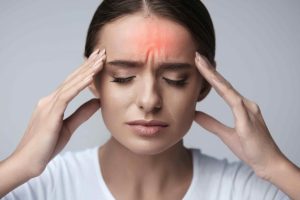
MIGRAINE
Migraine. A migraine is characterized by intense pain on one side of the head that throbs and pulses; the headache phase typically lasts four hours or longer, but can sometimes last for days; it is exacerbated by physical activity; bright lights; loud noises; and strong odors; migraines are disruptive, interfering with daily activities and making it difficult to fulfill social and personal commitments; however, there are treatments available to help manage migraines.
MIGRAINE
A migraine is not just a terrible headache. You may be bedridden for days due to crippling, throbbing, one-sided headache agony. Weariness, nausea, changes in vision, irritation, and other symptoms can be brought on by movement, lights, sounds, and other stimuli. To prevent migraines from taking over your life, a healthcare professional can assist you in managing your symptoms.
Stages

Prodrome: The initial stage starts up to twenty-four hours before you get a headache.
An aura is a collection of verbal, motor, and/or sensory symptoms that serve as a migraine headache warning indicator. The aura phase may last five minutes or as long as sixty minutes. It’s possible for you to feel the headache and aura simultaneously.
Headache: The duration of a migraine headache ranges from four to seventy-two hours.
Postdrome: This phase often lasts anything from a few hours to 48 hours. The postdrome phase is referred to as a migraine hangover. because the symptoms resemble those of an alcohol-induced hangover.
The four stages can be completed in eight to seventy-two hours.
Symptoms

The stage of migraine affects the symptoms. You won’t always have symptoms during all four phases of a migraine because each one is unique.
Prodrome signs and symptoms
The mood shifts.
having trouble focusing.
difficulty falling asleep.
Fatigue.
Nausea.
heightened thirst and hunger.
frequent urination.
Symptoms of aura
weakening of the muscles.
Vision shifts.
Tinnitus, or ringing in the ears.
Touch sensitivity, or the sensation that you are being touched.
tingling and numbness.
difficulty focusing or speaking.
Causes
Studies indicate that genetics may be a contributing factor in migraines, while the precise explanation is unknownYour brain receives pain signals from particular nerves in your blood vessels when you experience a headache. This causes the blood vessels and nerves in your head to become inflamed. You don’t know why your nerves do that.
Treatment

A medical professional may advise taking medicine to treat migraines. Two categories of drugs are accessible:
Drugs to prevent migraines: These drugs can be taken as soon as it appears. They prevent or lessen the pain, nausea, sensitivity, and other symptoms of migraines.
Medication for migraine prevention: If you have regular migraines or severe symptoms that disrupt your routine, your doctor will likely prescribe preventive medicine. These drugs lessen the frequency and intensity of migraine attacks. These drugs can be taken as prescribed, typically once a day.
Preventing migraine triggers A doctor can help you figure out what causes your migraines, and they might ask you to keep a migraine diary or journal. You can record when a migraine occurs, how you feel, and how long it lasts, as well as information about the foods you eat or activities you did to learn more about potential triggers. There are smartphone apps that can help you keep a migraine diary.
Summary
A migraine is not the same as a headache, which you have most likely experienced previously. It can seem like the world is dying, and there is nothing you can do to stop it. The length of a migraine might make you feel as though time is slipping away from you, even though your symptoms are only transitory. However, there are ways to control migraines when they occur and keep them from ruining your day. To prevent migraines from controlling your life, a healthcare professional can assist you with this.